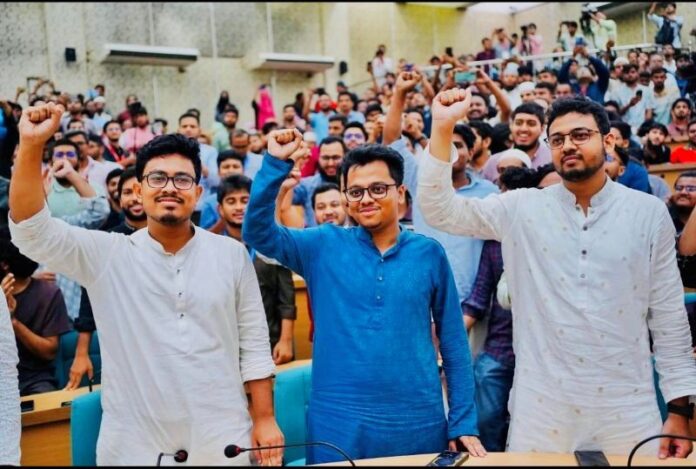Paromita Das
New Delhi, 17th September: It barely made a ripple in Bharat’s crowded news cycle, yet the recent student elections at Dhaka University may prove to be one of the most significant developments in South Asia this year. For the first time since Bangladesh’s independence in 1971, the Islami Chhatra Shibir—the student wing of Jamaat-e-Islami—swept the Dhaka University Central Students’ Union (DUCSU).
At first glance, it was “just” a student election. But Dhaka University has always been more than a campus; it has been the crucible of Bangladesh’s political destiny. From the 1952 Language Movement to the 1971 Liberation War, the university has shaped national narratives and foreshadowed larger political shifts. This latest result is no different. It marks the resurgence of Jamaat-e-Islami, a party once marginalized for its collaborationist role during the Liberation War, and it signals a dramatic transformation in Bangladesh’s political landscape.
The Fall of the Old Guard

To grasp the weight of Jamaat’s triumph, one must place it against the backdrop of Bangladesh’s upheaval. Earlier this year, Sheikh Hasina’s Awami League—New Delhi’s most dependable ally—fell from power amid mass student-led protests. The once-mighty party, after ruling for more than 15 years, now stands banned from contesting the upcoming 2026 elections. Its leader lives in exile.
The opposition Bangladesh Nationalist Party (BNP), long seen as the only viable alternative, is no stronger. Its matriarch, Begum Khaleda Zia, is frail and absent from politics, while much of its leadership languishes abroad, detached from the struggles of ordinary citizens. What remains is a hollowed-out movement, clinging to relevance but unable to inspire the energy of a restless electorate.
This collapse of the two giants has created a political vacuum—one that Jamaat-e-Islami has been quietly preparing to fill. With deep organizational roots, an efficient cadre system, and a robust welfare network, Jamaat has reemerged from the shadows. The DUCSU victory is not merely symbolic; it is the first tangible proof of its political resurgence.
Beyond Islamism: A Vote Against Corruption

It would be misleading to read Jamaat’s student victory as a sweeping Islamist wave among Bangladesh’s youth. For many young voters, the choice was less about ideology and more about disillusionment. Decades of corruption, nepotism, and political violence under both the Awami League and the BNP have left Bangladeshis yearning for a fresh alternative.
For a generation born decades after 1971, Jamaat’s controversial wartime history carries less emotional weight. What matters instead are jobs, governance, and accountability. In Jamaat, many students saw a force untainted by the failures of the two traditional parties. In this sense, the Dhaka University election mirrors a broader global trend: frustrated electorates turning to outsider groups, no matter how extreme, in search of “clean” leadership.
The View from New Delhi: Alarming Signals

For Bharat, this is no routine campus poll. The rise of Jamaat portends serious implications for national security and regional diplomacy. Under Sheikh Hasina, New Delhi enjoyed unprecedented cooperation with Dhaka on counter-terrorism, cross-border infrastructure, and insurgent crackdowns. That era may now be closing.
A Jamaat-led or Jamaat-influenced government could fundamentally shift Bangladesh’s orientation in three dangerous ways:
- Border Security Risks: Jamaat has historical ties with Islamist groups sympathetic to Pakistan’s ISI. Its rise could embolden anti-Bharat insurgents in Assam, Tripura, and Meghalaya, undoing years of counter-terrorism gains.
- Persecution of Minorities: Bangladesh’s Hindu community has often suffered during political instability. Under regimes sympathetic to hardline Islamists, attacks on temples, homes, and businesses have spiked. Communal violence could send refugee flows toward Bharat’s borders.
- Geopolitical Realignment: A Jamaat-influenced government might tilt toward China or Turkey, both eager to strengthen their footholds in South Asia. Such a shift would directly threaten Bharat’s Act East policy and weaken regional platforms like BIMSTEC.
A Dangerous Complacency

Bharat has long viewed Bangladeshi politics through the binary lens of Awami League versus BNP. That framework is now obsolete. The DUCSU results show that the real energy lies elsewhere, in forces that were once dismissed as marginal. To ignore this shift would be dangerously naïve.
New Delhi must act swiftly and decisively. That means strengthening border management, preparing for possible refugee crises, and forging ties not only with the interim administration under Muhammad Yunus but also with emerging political actors, including moderate elements within Jamaat. Diplomacy must be nimble, not nostalgic. The stakes are too high for complacency.
The Tremors from Dhaka
The Jamaat-e-Islami’s victory at Dhaka University may have seemed a footnote to casual observers, but in reality, it was a political earthquake. It revealed both the exhaustion of Bangladesh’s old political order and the rise of a new, unpredictable force.
The tremors from Dhaka will not remain confined to Bangladesh. They will ripple across Bharat’s eastern frontier, testing its security, diplomacy, and resolve. For New Delhi, the message is clear: a new chapter is unfolding in Bangladesh’s history, and Bharat must prepare to face its challenges head-on.
The post A New Tide in Bangladesh: Jamaat Rises as Old Giants Fall appeared first on Global Governance News- Asia's First Bilingual News portal for Global News and Updates.



